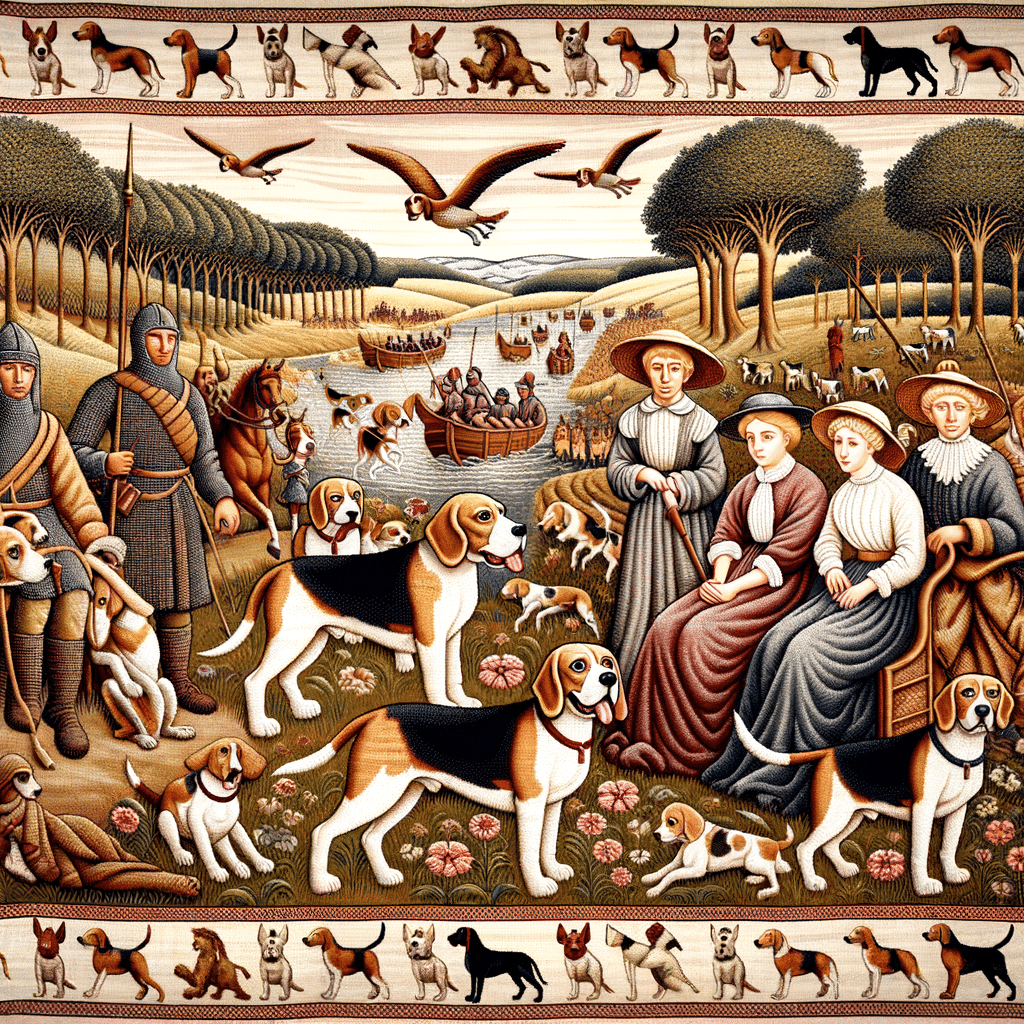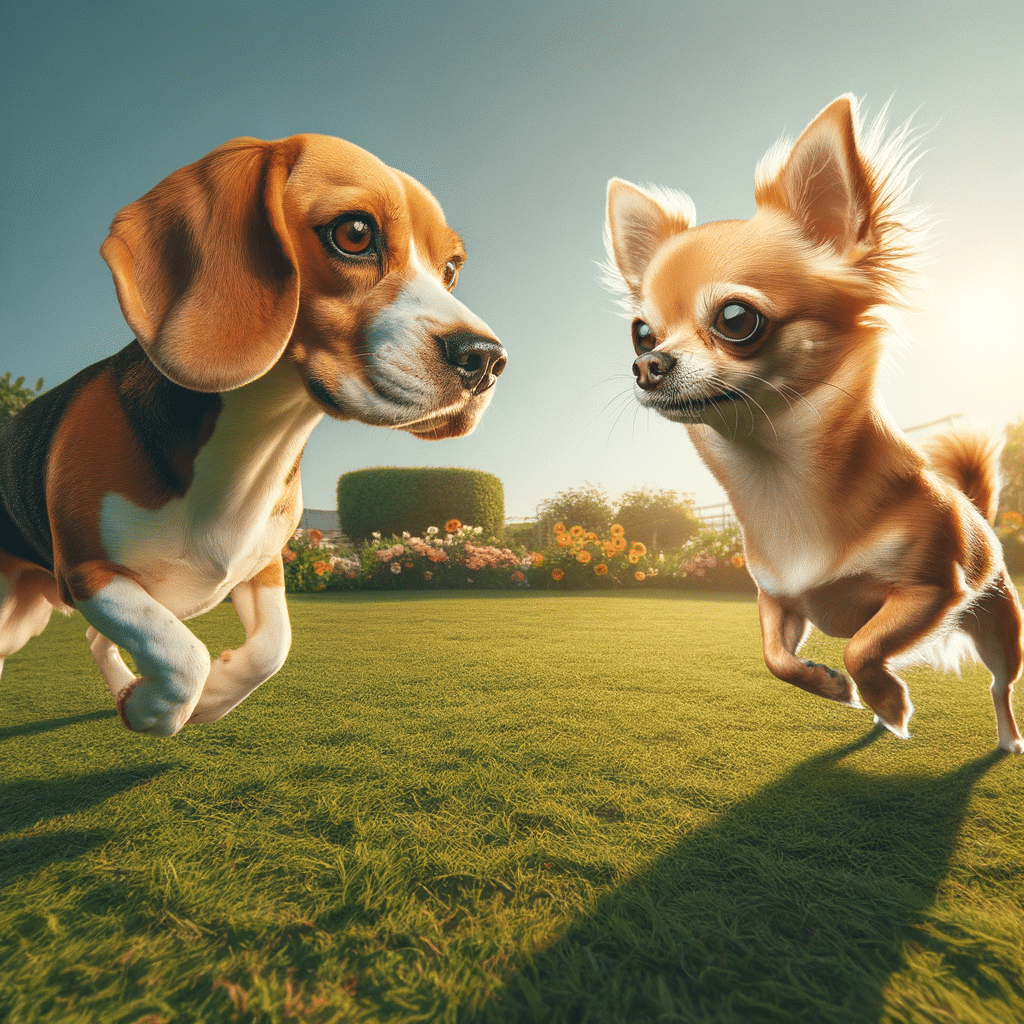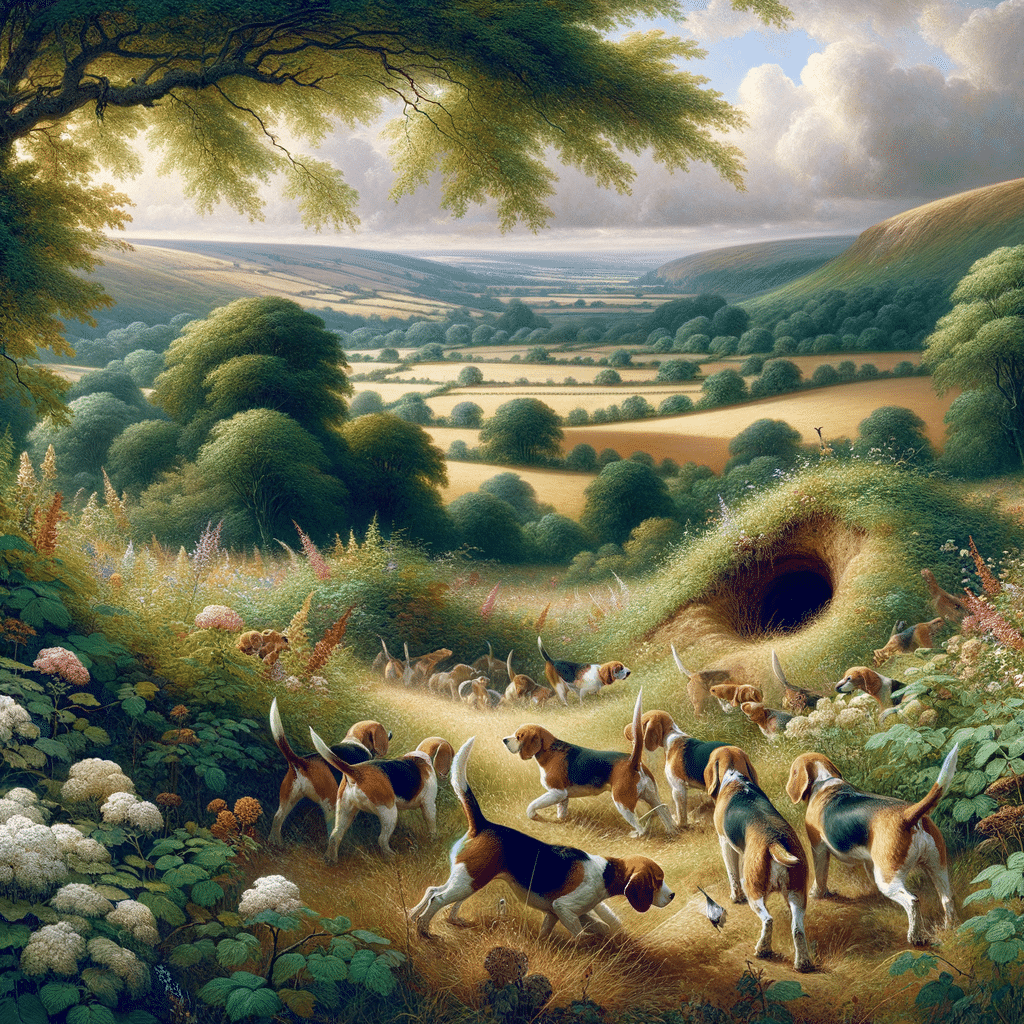Beagles are a beloved breed of dog known for their affable nature and compact size. They are a popular choice for family pets. Despite their widespread reputation as gentle companions, their origins are rooted in hunting.
In This Article
Beagles have an extensive history as hunting dogs and continue to be used today. They possess a sensitive sense of smell and remarkable endurance, traits honed over centuries to assist hunters in tracking small game like rabbits and hares.
These dogs are favored for more than just their tracking abilities. Their small stature and amiable personality contribute to their reputation as versatile hunters and family dogs. Trained beagles are known for their effectiveness in the field, thanks to their instincts and proper guidance.
While they excel in hunting, the breed’s characteristics allow them to adapt well to home environments, striking a unique balance between an active sporting dog and a companion animal.
Highlights
- Beagles have a long history as proficient hunting dogs and are valued for tracking small game.
- Their unique traits and characteristics make them suitable for both hunting and companionship.
- Proper training and handling reinforce the beagle’s instincts for various hunting methods.
Beagles and Their Hunting Heritage
Beagles are recognized for their exceptional hunting capabilities, particularly in rabbit hunting, which can be attributed to their strong instincts and historical development as a breed in Great Britain.
Historical Role of Beagles in Hunting
The history of beagles as hunting dogs can be traced back to Great Britain. They were developed primarily for hunting small game due to their keen sense of smell and stamina. Beagles are descendants of breeds such as the foxhound, bloodhound, greyhound, harrier, and Southern hound. Their size and agility made them excellent for pursuing rabbits and hares through dense underbrush.
The development of the beagle as a hunting breed is often credited to Reverend Phillip Honeywood, who established a beagle pack in Essex, England, in the 1830s. His beagles were bred for their hunting abilities, particularly for tracking hares by scent rather than speed. Over time, this emphasis on scent work became a defining characteristic of the breed.
Beagle Breeds and Hunting
While kennel clubs essentially recognize one breed of beagle, historical variations in size influenced hunting roles. Smaller varieties were suitable for hunting small game like rabbits, cultivating strong hunting instincts. Like their foxhound ancestors, larger beagles could also pursue larger prey.
Beagles possess innate hunting instincts that make them persistent trackers, a quality still apparent in the breed today. Their determination and tirelessness when on the scent trail make them valuable companions for hunters pursuing a variety of game. Beagles’ remarkable ability to pick up and follow scents over long distances is unmatched by many other breeds, a testament to their historical purpose.
Traits and Characteristics
Beagles are renowned for their exceptional hunting abilities, primarily due to their physical and sensory attributes and distinctive personality and behavior traits.
Physical and Sensory Traits
- Nose and sense of smell: Beagles possess one of dog breeds' most acute olfactory senses. Their highly developed noses enable them to track scents over considerable distances. This sharp sense of smell makes them indispensable for scenting roles, such as those performed by the Beagle Brigade at US airports in detecting agricultural goods.
- Ears: With long, hound-type ears, beagles can collect and channel scents toward their nose, aiding their scenting ability. Their ears are set low on a broad head, further enhancing their hunting capabilities.
- Size and stamina: Beagles are a small to medium-sized breed, often standing between 13 to 15 inches at the shoulder. They are muscular and have high stamina, allowing them to follow trails tirelessly.
- Coat: Typically, beagles sport a double coat that provides protection in thick underbrush. Tri-color beagles, displaying black, brown, and white, are quite common.
Personality and Behavior
- Energy and eagerness to track: They exhibit a great deal of energy, bred into them to channel their enthusiasm for tracking. Their persistent and determined nature makes them relentless when on the scent trail.
- Baying: As hunting dogs, beagles are known for their distinctive baying, a loud and deep howl that alerts hunters when they have located their prey. This vocalization is a hallmark of their hunting behavior.
- Social temperament: Beagles are typically friendly, enjoying the company of humans and other dogs. This sociable nature is highly desirable in hunting packs, where cooperation is key.
- Neck and tail: They have a moderately long neck that aids in scenting, and their tails are usually carried high, giving visual cues to their human companions during a hunt.
Training and Handling Beagles
Training and handling Beagles for hunting involves consistent exercise, adherence to the breed’s instincts as a scent hound, and understanding the American Kennel Club’s standards. Proper care is fundamental to maintaining the breed’s health and hunting efficiency.
Training Techniques for Hunting
The fundamental aspect of training Beagles for hunting lies in leveraging their natural scent-tracking abilities.
- Tracking training: Introduce the beagle to various scents and encourage them to follow trails during training sessions. Training should be gradual, starting with short tracks and moving to more complex tracks.
- Exercise: Regular exercise, including daily walks and running, is vital to keep the dog physically fit and mentally prepared for the rigors of hunting.
- Working with beagle packs: Beagles often hunt in packs, so it’s essential to socialize them with other dogs to work effectively in team hunting scenarios.
Beagle owners should also select training that aligns with the AKC breed standard, emphasizing traits like determination and adaptability. Breeders may selectively breed beagles for these traits to improve hunting efficiency.
Caring for a Hunting Beagle
Caring for a hunting beagle extends beyond basic needs; it involves attention to their unique requirements as active hunting dogs.
- Exercise needs: A beagle’s exercise regimen should include more than ordinary play; it should mimic hunting conditions, like hiking through diverse terrain.
- Health concerns: Look for health problems common to beagles and ensure regular veterinary check-ups.
- Nutrition: Provide a diet that supports the beagle’s high energy requirements, especially during hunting seasons.
Proper handling encompasses the hunting dog’s physical and psychological well-being, ensuring they are not only capable hunters but also well-adjusted companions.
Beagle’s Prey and Hunting Methods
Beagles are adept hunters, famed for their sensitive sense of smell and impressive track record in pursuing small- to medium-sized game.
Species Targeted by Hunting Beagles
- Rabbits: A primary target for beagles due to their size and the challenge they pose.
- Hares: Similar to rabbits, hares are often pursued by beagles.
- Foxes: Some beagles are trained to track and hunt foxes.
- Deer: Although less common, beagles can be used to track deer.
- Coyotes and wild boar: In certain regions, these larger animals are also hunted by beagles.
Techniques and Hunting Styles
- Scent tracking: Beagles have an extraordinary sense of scent to track prey. They typically follow scent trails with their noses to the ground.
- Baying: While tracking, beagles use their distinctive howl, or bay, to alert hunters to their location and the prey’s position.
- Beagling: This term refers to hunting with beagles, focusing on the chase rather than the kill.
Beagles exhibit a relentless pursuit when hunting, using both their acute olfactory abilities and energetic stamina. However, they’re not typically used as bird dogs due to their specialized scent-tracking skills for ground-dwelling animals rather than airborne game.
Frequently Asked Questions
Beagles have a storied history as efficient hunting dogs, excelling in tracking and hunting small game due to their sharp sense of smell and stamina. This section answers common questions about their hunting role and related characteristics.
What prey are beagles traditionally used to hunt?
Traditionally, beagles were bred to hunt small game, especially rabbits and hares. Their powerful nose and relentless pursuit make them ideal for this purpose.
How do hunting beagles differ from show beagles in terms of traits and behavior?
Hunting beagles tend to have a stronger prey drive and exhibit more stamina and determination when following a scent. Show beagles might be bred more for appearance and temperament that conforms to breed standards with less emphasis on hunting traits.
What are the common uses for beagles besides hunting?
Aside from hunting, beagles are often used as detection dogs due to their exceptional sense of smell. They are also popular family pets, valued for their sociable and friendly demeanor.
Can beagles be prone to digging, and how does it relate to their hunting instincts?
Beagles may dig as part of their instinctual behavior to search for and flush out prey hiding in underground tunnels and dens. This trait can manifest in non-hunting situations as a form of exploration or play.
What are the health concerns that a hunting beagle may face throughout its life?
Hunting beagles may face health issues such as joint problems, particularly in the hips and knees, as well as injuries from rough terrain or encounters with wildlife. Proper care and regular veterinary check-ups can help manage these risks.
How does the beagle’s personality and temperament contribute to its hunting abilities?
The beagle’s enthusiastic and determined nature complements its hunting abilities. Its friendly temperament makes it a good pack hunter, cooperating well with other dogs and responding to human direction during a hunt.






